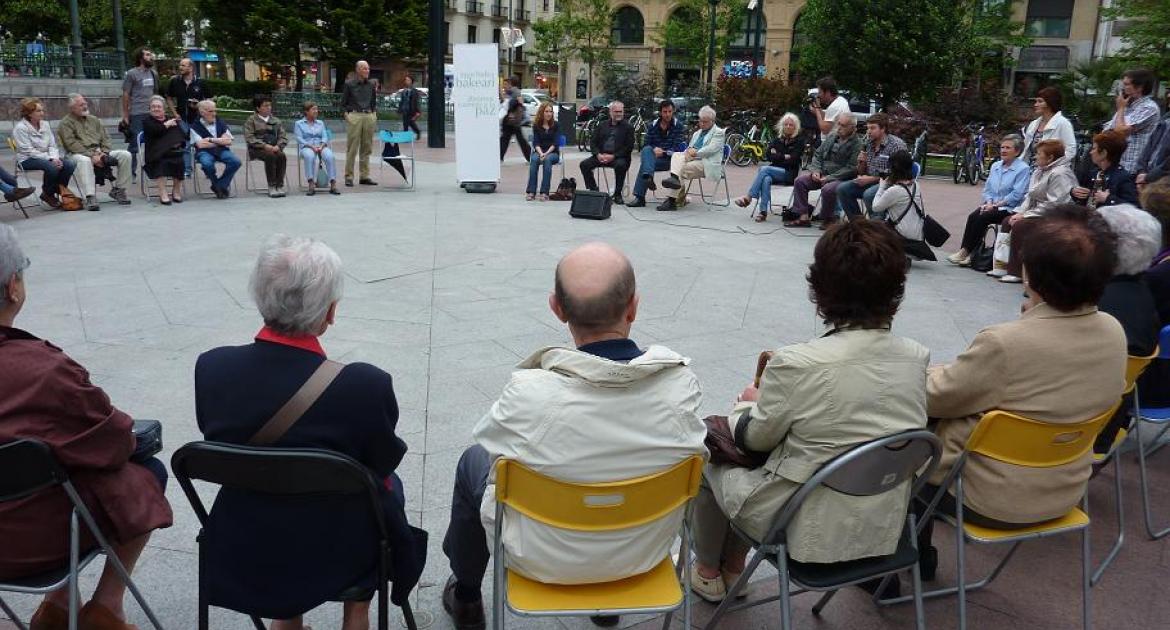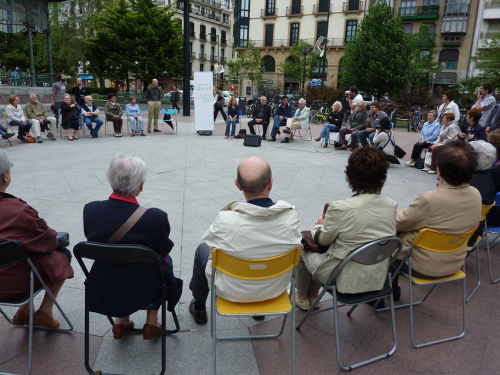Memory and Commons


> Introduction
> Proposal for the Workshop
> Objectives
> Methodology
> Calendar
> Registrations
Introduction
“Commons memory could be something like a collective memory open to all, to be shared by as many people as can benefit from it, in endless enrichment, where anybody can contribute; a memory that helps each one of us to understand some key elements of our world and guide us within it. It belongs to everyone and no one.
Commons memory is the memory of something that is no longer evident, that is in danger and needs protection, also of something we can enrich by creating the tools that will enable us to do so.
Everyone has and keeps remembrances of something that has happened, something that was lived more or less directly or that has been transmitted. Memory is a fabric made of remembrances, which remain not individual but become collective ones, shareable and with a meaning. Memory is a collective construction of remembrances which supports collectives to pave their way.
Memory must not be contrasted with history as something subjective, irresponsible and full of myths as opposed to something scientific, objective, true and provable, because history also has its subjective burden, it is influenced by the dominant power, it includes myths and leaves aside immense parts of lived reality.
Memory accompanies history gathering issues that are important, but that history itself leaves aside, and invites history to enter them using its scientific instruments of definition and verification in order to confirm or redirect them.
Memory also is what is burning in history, what we question of it because we care and because we do not accept the version that we are given of it without questioning.
By constructing memory we bring attention to things that had not attracted attention. Thus we mobilize memories that had so far remained hidden and quite in citizenship.
"life peace"
This project is intended to construct memory of life peace, that – interwoven with violence and negative peace - has been a component of our reality since 1936 to 1978, but that has been excluded, up until now, of the memory construction of that reality – both from the official memory coined by Franco’s regime and from the memory constructed by the MRMH (The Movement for the Recuperation of Historic Memory)-.
This project assumes that in this life peace we find the quintessence of what is common, because this peace that one human being gives another – we can use as an example/icon the mother that conceives in a child in her womb and nurtures it -, is what holds the world together. We have to remember it (peace) to build with those remembrances Commons memory.
However, the labor of this life peace does not attract attention, remembering is not being used to build memory. Remembering is not being used because there are constant reencounters, it appears to be evident, nothing is left behind. Neither memory nor history of this labor are being constructed, because mothers have always given life to their children, this has been always the case, it is taken for granted and nobody fears that they will cease to do so. This life peace makes life possible, it maintains the world united, it holds history, it is poetic, it knows how to rebel. But being the eternal sister to negative peace, she is an invisible sister, one that rarely receives any attention. What remains of her are generally dispersed memories with anecdotal value, almost in the manner of curiosities or oddities. With them memory is not built and they do not emerge in history during normal times. But today we need the support of this memory to open a path to the future.
That is the challenge of this project: to bring to light remembances of the labor of lived peace, make them public, understand by interpreting their sense, thus building a memory that inspires and educates towards an interactive conviviality of mutual respect, aid, understanding and affect".
Proposal of the workshop
The workshop will combine theoretical sessions, such as presentations and debates of the different topics related to commons memory, with practical work sessions, where we will discuss and share stories told by the participants.
Objectives
Our objectives are to reflect on and explore the construction of commons memory; starting with the first contribution and continuing with the definition of an idea, a methodology and the first results. For that purpose we want to take the following steps:
- Contribute to the construction of a commons memory of Spain from the Civil War onwards, with remembrances of events and processes that show life peace (see Attachment 3).
- Help the participants search and gather memories, understand their meaning and thus build a commons memory. Accompany them through their effort to collect hushed remembrances, hidden memories, give them shape, conserve them and make them public.
- Try methods such as interviews, information gathering, contrasting, narrating and archiving consistent with this understanding of commons memory (respect, right to forget, privacy, intimacy, anonymity).
Methodology
The workshop is organized in 4 stages; this does not exclude possible interim reunions.
We will propose that some of the participants tell some story that they have experienced or collected from their families, friends or surroundings about events that took place during the Civil War, the post-war era or even today. They can be of two kinds:- Stories of people that, regardless of the power they were subjected to, openly or secretly helped others who were under some kind of threat, danger or in need.
- Stories about the endless tricks, seesawing, cunnings, silences, bitten tongues and confrontations that families, with members in opposing sides, have had to endure in order to maintain their family united during the Civil War, bearing in mind the insults, rejections, abuses, violations and humiliations that took place between opposing sides.
- Why did they do it?
- If it was done secretly, why?
- When, to who and why did they tell it?
- What came out of it and what was it followed by?
Afterwards – and probably after a pause – the participants will be invited to organize themselves in small groups to comment on the stories. It is possible that some of them remember some other story of the same nature and might want to tell it. If that is so, a space of time should be given for him or her to do so.
In addition to spontaneous commentaries, other commentaries in accordance with the initial objectives of the workshop and the project will be required.
At all times during the workshop there shall be a dialogue between the participants reflecting on the stories that have been told to establish to what extent:
- They are bound to meet the initial objectives of the project.
- They can be improved and how to improve them.
- They are confirmed or if the suppositions on which the project and initial objective rely on need to be revised.
Hereafter, it will be necessary to set out and agree on the following steps in the development of the project -collection, focus and distribution of the memories-.
Calendar
23.11.2011
1st Reunion: presentation of the project and the participants.
Talk that will introduce the notion of commons related to memory
Talk on the relation history-memory
The guests from Madrid, or that can make it to Madrid, will explain their approach and what they plan to do during the workshop.
16.01.2011 / 7 pm. Lecture by Svetlana Broz. English with simultaneous translation [live streaming] [+info]
17.01.2012 / 10 am - 2 pm: Seminar with Svetlana Broz (English without translation). [+info]
17.01.2012 / 5 pm: Workshop with María García Alonso [live streaming] [+info]
18.01.2012 / Evening: Workshop with Pablo Sánchez León. [live streaming] [+info] Activity postponed
March 2012. Workshop 2nd part. Guests: María García Alonso, Frauke Schulz and Jorge Blasco.
05.03.2012 / 5 pm. Lecture by Juan Gutiérrez [live streaming] [+info]
06.03.2012 / 5 pm. "Digital Memory" by Jorge Blasco. [live streaming] [+info]
07.03.2012 / 5 pm. Internal session. [live streaming] [+info]"Digital Memory" by Jorge Blasco. [live streaming] [+info]
May 2012
23.05.2012 / 17:00h: Sharing session and public presentation of the stories archive digital platform developed by Beatriz García Rodríguez (@torcuataTK) [+info]
November 2012
29.11.2012 / 17:00h: Sharing session about the present, the past and the future of this work group. [+info]
May 2013
07.04.2013 / 17:00h: Presentation by Cristina Sánchez-Carretero, professor of Anthropology at the Institute of Patrimony Sciences in Santiago de Compostela around the concept of memory as patrimony, its creation, dissemination and preservation. [+info]
Registrations
The call is open to everybody who would like to participate, bearing in mind that it might be limited to an optimal number of people to work in groups, we propose approximately 25 people per group.
The inscriptions will require the participants to state their motivations and expectations.
Form closed



 Medialab-Matadero Madrid
Medialab-Matadero Madrid